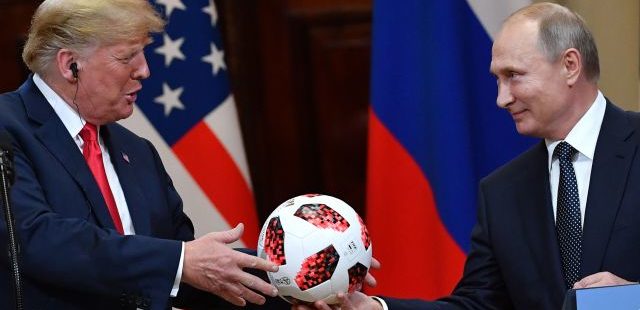

READ ORIGINAL ARTICLE AT THE WASHINGTON POST
Garry Kasparov
President Trump and Russian president-for-life Vladimir Putin’s news conference in Helsinki on Monday was the lowest point in the history of the American presidency. Standing next to a dictatorial leader accused by U.S. intelligence and law enforcement of attacking the foundations of American democracy, Trump often appeared confused and incoherent — and those were his best moments at the podium. The rest of the time he spent praising the KGB dictator to his left and attacking the institutions he swore an oath to defend. It was a Russia First performance, from beginning to end.
Even for those of us who had very low expectations, and who considered the mere existence of this summit to be a catastrophe, the reality of it was much worse. Trump did such a thorough job of presenting the Kremlin line that Putin barely had to exert himself to respond with his habitual mix of denials and deflections. It was a brutal reality check for those still deluded enough to hope that Trump represents the national interests of the United States, or the interests of anyone other than himself and Putin.
For Putin, the summit was a great success before it even started. Without the recurrent legitimacy of the ballot box — I assume no one still believes that Russia’s elections are real — dictators crave ways to demonstrate their credibility and to pass off their own interests and power as those of the nation. The tried and true methods are war, hosting sporting spectacles and appearing with important foreign leaders, especially democratically elected ones. Putin has managed a hat trick with his invasion of Ukraine still ongoing, the World Cup that ended in Moscow on Sunday and an imposing performance in Helsinki next to a feeble and cowed American president.
Other than Putin wanting it badly, there was no purpose behind this spectacle in Helsinki. Putin’s wish list is transparent: legitimacy as the ruler of Russia and stature on the global stage; Russia as power broker in Ukraine, Syria and Iran; weakening the United States’ commitment to its Group of Seven allies, NATO and the European Union; lowered Western defenses against his attacks; and Trump’s help in all these things. Putin also wants the United States to end sanctions and recognize his annexation of Crimea, but he senses that that would be too much to ask right now, and that they could be taken out of Trump’s hands if he pushes too far. In contrast, there is nothing the United States needs from Putin other than to stop the hostile acts that he uses to achieve his ends. He must be stopped, not negotiated with.
Despite the long list of Putin’s suspected atrocities, including the downing of Flight MH17 over Ukraine and aiding Bashar al-Assad’s massacres in Syria, Trump eagerly applied the Kremlin’s patented technique of moral equivalence, saying, “I hold both countries responsible” and that “we’re all to blame” for poor Russian America relations. To this I can only cite Polish writer Stanisław Jerzy Lec: Just when you think you’ve reached the bottom, someone knocks from below.
Last year I wrote that eventually Putin would boast about successfully influencing the U.S. election, leaving Trump as the last person on Earth still denying it. That moment is coming closer. Putin admitted that he wanted Trump to win, and then smirked as Trump contradicted U.S. intelligence services, who, along with those of other nations, have confirmed repeatedly that Russia was behind massive hacking and propaganda operations during the 2016 election. Trump also brushed off the new depths of detail included in last week’s indictment of a dozen Russian military intelligence operatives in the special counsel’s investigation.
Trump is quite bold on Twitter and when attacking American allies and his White House predecessors, but that so-called straight talk and nationalistic fervor were nowhere to be seen in Helsinki. He blasts former president Barack Obama for slow and weak responses to Putin’s annexation of Crimea and hacking of the U.S. election — accurately so, in my opinion, as I said at the time — but has only praise for the man who actually committed those crimes. Trump bullies democratic leaders like Germany’s Angela Merkel for not being tough enough on Russia — again, I concur — which makes no sense when in the next breath he says that Russia isn’t a threat.
Monday’s news conference marked a big step beyond such incoherence and into … something else. After spending two hours alone with Putin, itself an unacceptable risk at this point, Trump took to the stage to criticize his own country and to flatter Putin about the “extraordinary relationship” he was hoping they would have. Trump’s loyalists in Congress and on Fox News were shaken by this abject capitulation, as well they should have been. But the time to merely criticize Trump is long past. He’ll be on to the next outrage on Twitter in a matter of hours, and what happened in Helsinki must not be pushed off the front page or forgotten. The security and integrity of the United States and the free world are in danger. This is uncharted territory, and action is needed. Trump, like Putin, must be stopped before he does any further damage to American democracy and the world order.

